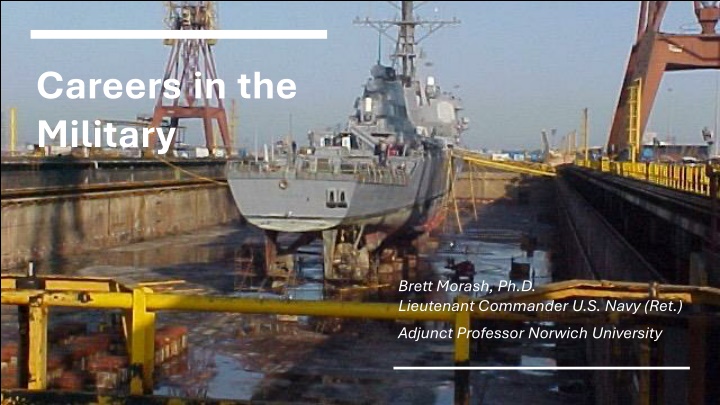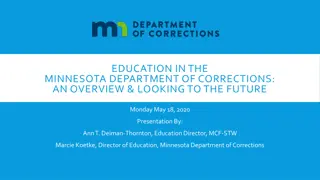
Exploring Careers in the Military: Insights from a Retired U.S. Navy Lieutenant Commander
Discover valuable insights on military career opportunities from Dr. Brett Morash, a retired U.S. Navy Lieutenant Commander with extensive experience. Learn about the benefits, requirements, and pathways to join the armed services. Explore the vast array of roles available and make informed decisions for a rewarding future in the military.
Download Presentation

Please find below an Image/Link to download the presentation.
The content on the website is provided AS IS for your information and personal use only. It may not be sold, licensed, or shared on other websites without obtaining consent from the author. If you encounter any issues during the download, it is possible that the publisher has removed the file from their server.
You are allowed to download the files provided on this website for personal or commercial use, subject to the condition that they are used lawfully. All files are the property of their respective owners.
The content on the website is provided AS IS for your information and personal use only. It may not be sold, licensed, or shared on other websites without obtaining consent from the author.
E N D
Presentation Transcript
Careers in the Military Brett Morash, Ph.D. Lieutenant Commander U.S. Navy (Ret.) Adjunct Professor Norwich University
Graduate of Massachusetts Maritime Academy B.S. Marine Transportation 20 Years as a Surface Warfare Officer Retired in 2013 Five Ships One Overseas Task Force Great Shore Duty After retirement Earned Ph.D. in Humanities (focus on Political Science) Worked in the Veteran Nonprofit Space Recently came over to US Dept of Housing and Urban Development (HUD) Quick Biography
Its all about the Experience ... especially back end Be objective driven the military is you should be too. Think about what you want to be in the future in uniform and as a civilian. Why are you doing this... College... Career... Adventure Pick a job that speaks to you. Service culture matters. If you can t decide then de-select services. On Water vs. Land Opportunities Quality of Life
Steady paycheck Benefits for Active Service Housing allowance Food allowance Zero cost medical for active duty 30 days paid time off yearly Pension System Thrift Savings Plan (like a 401k) Certifications and credentials GI Bill College costs plus allowances Veterans Administration Benefits after service
The Six Armed Services 1.3M Service Members with 800k in the Reserve Army: 36% (472,000) Navy: 24% (326,000) Air Force: 22% (323,000) Marine Corps: 14% (185,000) Coast Guard: 3% (42,000) Space Force: >1% (8,000)
Requirements to Join the Military You must be at least 17 to enlist in any branch of the active military. If you are not a U.S. citizen, you must: Have a permanent resident card, also known as a Green Card Currently live in the U.S. Speak, read, and write English fluently You must pass a military entrance medical exam. This includes a physical exam, hearing test, vision test, and height and weight measurements.
Armed Services Vocational Aptitude Battery (ASVAB) How to Join the Military Your scores on all 10 sub-tests determine which job specialties you qualify for. Four of the tests make up your Armed Forces Qualification Test (AFQT) score. Research research research Visit a recruitment office (talk to a veteran first) Then Military Entrance Processing Station (MEPS)
Armed Services Vocational Aptitude Battery (ASVAB) General Science (GS) Knowledge of physical and biological sciences Arithmetic Reasoning (AR) Ability to solve Arithmetic word problems Word Knowledge (WK) Ability to select the correct meaning of words presented in context and to identify the best synonym for a given word Paragraph Comprehension (PC) Ability to obtain information from written passages Math Knowledge (MK) Knowledge of high school mathematics principles Electronics Information (EI) Knowledge of electricity and electronics * Auto Information (AI) Knowledge of automobile technology * Shop Information (SI) Knowledge of tools and shop terminology and practice Mechanical Comprehension (MC) Knowledge of mechanical and physical principles Assembling Objects (AO) Ability to determine how an object will look when its parts are put together * Combined into one score
Military Occupational Specialty. There are over 10,000 different occupational specialties across the military. Equivalents: Career Paths Example: U.S. Marines MOS 0311 which is 03- Infantry plus 11 Rifleman (Private to Sergeant) Later in their career might change MOS as they get promoted 0369 Infantry Unit Leader NEC Navy Enlisted Code AFSC Air Force Specialty Code Career Management Field (CMF) is a group of specialties or branches . These groups of related specialties all have the same first two numbers. Each Service has Different Paths Technical vs. non-technical Payback of time
Question and Answers
Important Links www.Official-ASVAB.com https://www.usa.gov/join-military https://www.todaysmilitary.com/careers-benefits/explore-careers https://www.airforce.com/ https://www.goarmy.com/ https://www.navy.com/ https://www.uscg.mil/ https://www.marines.mil/ https://www.spaceforce.mil/


